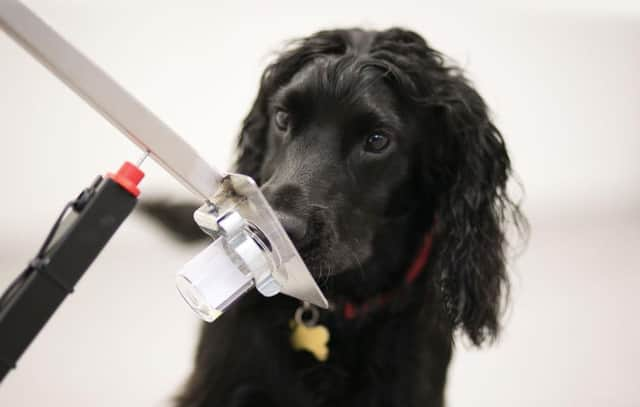Milton Keynes Hospital using dogs to sniff out cancer


Medical Detection Dogs are being officially trialled by the NHS for their ability to sniff out even the earliest stages of the disease.
Their noses are so sensitive they are leagues ahead of any technology invented by man, said the charity’s founder Claire Guest.
Advertisement
Hide AdAdvertisement
Hide AdShe is testament to her dog’s ability as she was alerted to her own breast cancer by a Labrador called Daisy seven years ago.
“Daisy kept nuzzling and pawing at my chest one day, which really alarmed me. I got it checked out and was told I had early stage breast cancer.”
Claire added: “Fortunately I was able to have it removed but if it wasn’t for Daisy it would have gone undetected for much longer and could have been more serious.”
The NHS trials are using breath samples taken from volunteers all over Buckinghamshire.
Advertisement
Hide AdAdvertisement
Hide AdAlthough it has not been determined what it is the dogs detect, it is thought volatile substances emitted by cancerous cells are present in cancer patients and give off an odour perceptible to dogs.
It has been proved that the canine nose, already used successfully to control diabetes, can detect the equivalent of one spoonful of sugar in two Olympic swimming pools.
Claire said: “This is such a fascinating area to study. It could revolutionise the way we think about breast cancer.
“If we succeed in proving that dogs can detect breast cancer on breath samples, younger women and women such as myself, who have had breast cancer and need regular checks to ensure the tumour has not returned, could simply breathe into a tube and find out quickly and safely their state of health.”
Advertisement
Hide AdAdvertisement
Hide AdMilton Keynes hospital has been using Claire’s Medical Detection Dogs in a prostate cancer detection trial for several months.
The dogs can sniff out traces of the disease from urine samples.
Consultant urologist Mr Iqbal Anjum is leading the project and more than 300 patients are taking part, along with 87 healthy volunteers.
Hospital chief executive Joe Harrison said: “Our work with the detection dogs is a great example of an exciting research project that may well shape how cancers are detected in the future.”